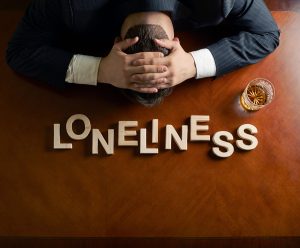Here I Am Again in the Same Old Situation
I Experience Alone: What To Do When You lot're Feeling Lonely
 "Why do I feel lonely?"
"Why do I feel lonely?"
Homo beings are instinctively social animals. It is natural for us to feel solitary or lonely when we are isolated from others. As a tribal species, our brains adjusted to rely on social connections as a means to survive. In fact, according to neuroscientist John Cacioppo, who has made a career out of studying loneliness, "The absence of social connection triggers the same, primal alarm bells as hunger, thirst and concrete pain."
Put just, "Humans don't do well if they're lone."
However, mod life, with all of its conveniences, has led to a sharp increment in isolation. As a result, loneliness is on the rise. Co-ordinate to Cacioppo, "The percentage of Americans who responded that they regularly or oftentimes felt lonely was between 11% and 20% in the 1970s and 1980s… The American Association of Retired Persons(AARP) did a nationally representative study in 2010 and found information technology was closer to 40% to 45%."
When we find ourselves condign isolated, nosotros should take that as a warning sign that nosotros may turning against ourselves in some basic way. The path of isolation leads to loneliness, despair, and even depression.
"I feel lonely? What'due south wrong with me?"
When nosotros feel lonely, we oft tend to crush ourselves up and think that something is just wrong with us. The more than lonely we experience, the more we kickoff to have thoughts of non belonging or of feeling rejected by others. Left alone with our thoughts, nosotros go our ain worst enemy. An isolated space is the perfect breeding ground for negative, cocky-critical thoughts. These thought patterns make up the "critical inner voice (CIV)," an internalized enemy that leads toself-destructive thought processes and behaviors. This inner critic feeds into our feelings of isolation, encouraging us to avoid others and remain in a lonely state.
Although our disquisitional inner voices may tell us otherwise, in reality, there is naught inherently incorrect with us that leads usa to be lonely. It is a common misconception that people are lonely because they have poor social skills. In fact, new research shows that lonely people accept perfectly adequate social skills and even out perform non-alone individuals when information technology comes to reading social cues. Notwithstanding, when "social pressure level" is introduced to social skills tests, solitary people often begin to choke. They start to experience very anxious or fear failure. In essence, their cocky-limiting beliefs or critical inner voices interfere with their natural social abilities.
Loneliness is not quantified by the corporeality of time we spend lone, but rather by how we feel near the fourth dimension we spend alone. Cacioppo defines loneliness, as "perceived social isolation, or the discrepancy betwixt what you want from your social relationships and your perception of those relationships." Feeling lonely can trigger thoughts that we are unloved or unlikeable. Your disquisitional inner voice will come up up with a nasty list of reasons that you are lone, viciously attacking you lot and the people effectually you. For example, yous may assail yourself for being "awkward" or "creepy" and then act quiet in a grouping of people. Subsequently, you may then assault yourself for not talking enough. These thoughts reflect a hostile and unfriendly point of view toward yourself. Treat these thoughts like they were coming from an external enemy, and do non tolerate them.
"What causes loneliness?"
At that place are several factors that pb individuals to feel lonely. The main causes of loneliness being:
- Heredity – According to John Cacioppo, "Loneliness is about l% heritable, simply this does not hateful loneliness is determined by genes. What appears to be heritable is the intensity of pain felt when one feels socially isolated." Depending on their genes, some people are more probable to feel more pain or perceive themselves equally more than alone when they are out of touch from others.
- Environment– Loneliness is often triggered by one'southward surroundings. If i lives in an isolated area or has recently moved to a new location, they are more susceptible to loneliness. Furthermore, moving to a new state or studying abroad, where language or cultural barriers tin complicate social interactions can also lead people to feel more solitary.
- Circumstances – Painful life circumstances, such equally divorce or loss, tin increase feelings of loneliness.
- Thoughts & Attitudes – The way nosotros recall and experience about ourselves and the world around us tin also trigger loneliness.
At that place are other psychological and developmental factors that can lead to feeling alone. Severely lonely individuals ofttimes report:
- History of abuse
- Hostile/intrusive or withdrawn/misattuned parents
- Disorganized or anxious ambivalent attachment manner and problems with communication
- Internalization of parent/ zipper figures
- Feelings of hostility or helplessness

"Is loneliness serious?"
Although, temporary times of loneliness are common and can laissez passer quickly, loneliness can be a chronic status with serious, harmful furnishings on both one'south physical and mental health. The effects of long-term loneliness on psychical wellness include, diminished sleep quality, weakened health, and even increased mortality. While the effects on i'southward mental health include low, timidity, misremembering, and focus on exclusion rather than inclusion (which perpetuates the disquisitional inner vox).
Studies are now showing that a lonely brain is structurally and biochemically different. The neural response to positive events and images get suppressed, then the world is perceived through a negative filter. When we are lonely, we are more probable to see things as hopeless. We may feel that the world around united states of america is threatening or across our control. This makes it difficult to summon upwardly the energy and backbone to detect happiness and change.


Length: xc Minutes
Toll: $15
On-Demand Webinars
In this Webinar: Learn nearly the psychological roots of loneliness. Overcome the critical inner voice that perpetuates feelings of isolation. Challenge the psychological…
"How can I finish feeling so alone?"
Loneliness is not a helpless status. In that location are actions you can have to combat feeling alone and begin to accept more meaningful, social connections in your life.
Challenge Your Inner Critic
In their research, male parent and girl psychologists Drs. Robert and Lisa Firestone found that the most common negative idea people accept toward themselves is that they are "dissimilar from other people." These self-limiting beliefs can keep you lot stuck in a wheel of loneliness. Your critical inner voices try to keep you from challenging yourself to pace outside your comfort zone, then stab you in the back for avoiding taking action. When you hear these self-attacks, information technology is vital that you do non allow them to manipulate your behavior. Acknowledge your feelings of loneliness and isolation without judgment, saying to yourself "I feel solitary right at present, but I am not going to give in to my critical inner voice and beat myself upwardly about information technology." Instead, you lot can learn to challenge your inner critic.
Acquire how to Overcome Your Inner Critic in this online form.
Practice Self-Pity
Cocky-compassion is the radical act of treating yourself with the aforementioned kindness that y'all would treat a friend. Researcher Dr. Kristen Neff has constitute that self-compassion leads to "greater emotional resilience, more accurate cocky-concepts, [and] more caring relationship behavior." Co-ordinate to Dr. Neff, self-pity involves 3 main elements. Permit'southward break these elements downward in relation to combatting loneliness:
Self-kindness Vs. Self-judgment – "Self-compassion entails being warm and understanding toward ourselves when we suffer, neglect, or feel inadequate, rather than ignoring our pain or flagellating ourselves with self-criticism," Dr. Neff says. When nosotros feel isolated or alone, we can choose to have compassion for ourselves. We tin recognize our emotions without judging them, perhaps saying to ourselves, "I'thousand really hurting correct now." Denying the reality of our hurting only leads to more suffering and frustration. "When this reality is accepted with sympathy and kindness," says Dr. Neff, "Greater emotional self-possession is experienced." When we have where we are at and what we are struggling against, without berating ourselves, we can so brainstorm to modify.
Mindfulness Vs. Over-identification with thoughts – According to Dr. Neff, "Self-pity also requires taking a counterbalanced approach to our negative emotions so that feelings are neither suppressed nor exaggerated." You tin observe your negative thoughts without accepting them as truth or allowing them to dictate your actions. Mindfulness teaches usa non to over-identify "with thoughts feelings , and then that nosotros are defenseless upwardly and swept away past negative reactivity." If y'all are feeling lonely, exist wary of labels; you are not "alone," a "loser," a "recluse," "bad at making friends," etc. Cover the non-judgemental nature of mindfulness.
Common humanity Vs. Isolation– Fifty-fifty when yous are feeling isolated from others, you can begin to recognize your common humanity. ALL humans suffer. ALL humans are wired for social connection and volition feel pain when they feel emotionally isolated from others. "The very definition of beingness "human" means that one is mortal, vulnerable and imperfect," says Dr. Neff, "Therefore, cocky-pity involves recognizing that suffering and personal inadequacy is part of the shared human experience – something that we all go through rather than being something that happens to 'me' alone." Even though you are feeling alone, it is important to recognize that you are non alone in this pain. Simply look at the comment section beneath. The world is full of alone people.
Read about The Many Benefits of Self-Compassion
Take Steps to Break Free From Isolation
Come up up with a program and begin to take steps to break free from isolation. Ask yourself the following questions:
When do I experience the most alone?
When do I feel the to the lowest degree alone?
What activities do I most enjoy?
Is at that place anyone I experience good spending fourth dimension with? Listing their names.
Now think about some physical ways to address your answers to those questions:
How tin you feel less lone at those lonely times? Can you lot accomplish out to a friend? Bring together an online chat community? Find a healthy way to distract yourself from the loneliness, like exercise, meditation, or even temporarily playing a distracting video game?
Why practise yous think you feel less alone at certain times? How can you expand on those positive times? For example, if you lot feel good at work, maybe you lot could spend more fourth dimension with your coworkers or find hobbies like volunteering that build on similar skills you enjoy sharing at work.
Are the activities you enjoy social? If and then, how can you participate in these activities more than? If the activities are isolated, how can you connect with others who enjoy these activities? The Internet is an incredible resources for building community with people around the world who share your interests. People who utilize the Internet to really connect with others are less probable to feel lonely.
If in that location are friends, coworkers, or family members that you lot experience adept existence effectually, make plans to spend more time with them. Think of activities you could do together or things yous could share on a more regular basis.
Because our brains do not reply positively to seclusion, identify yourself in social settings, even if you are amid strangers. If you lot feel shy in public, attempt going online. Interacting on the Internet may be a good first step in giving you the confidence to express yourself. Fight hard against the critical inner voices that endeavour to talk you into isolating yourself.
Practice Generosity
One of the best actions nosotros can accept to counteract the hopelessness we may feel is to think outside of ourselves. Generosity is a natural repellant against self-hatred. Believe beyond all doubt that you lot accept something to offer! Volunteering is a slap-up exercise in thinking outside yourself and oft gives you the opportunity to connect with new people. Even footling acts of generosity can take a significant impact. Generosity, as a principle, can pb to stronger self-esteem, which so leads to more social behavior.
To learn more about where loneliness comes from and how y'all can combat information technology, watch our Webinar on A Mode Out of Loneliness
If you lot are feeling isolated and may exist experiencing symptoms of depression, here are some helpful resources:
National Plant of Mental Wellness – Low
Depression.com
WebMD – Low
Helpguide.org – Low
Depression-Screening.org
GET HELP: IF YOU OR SOMEONE You lot KNOW IS IN Crisis OR IN NEED OF Immediate Assistance, CALLone-800-273-TALK(8255).
This is a free hotline bachelor 24 hours a day to anyone in emotional distress or suicidal crunch.
International readers can click here for a list of helplines and crisis centers around the globe.
Tags: alone, depression, isolated, isolation, loneliness, alone, loss, sad
Source: https://www.psychalive.org/isolation-and-loneliness/

